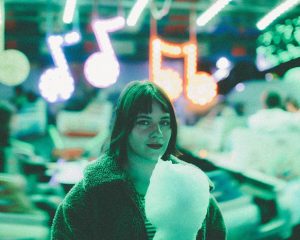The cover art for Vanille’s album Soleil ’96 looks more like it came out in 1968. Admittedly, the young Rachel Leblanc, the person behind Vanille, can boast being born in the mid-90s – but she totally owns the “old soul” label because of her passion for the stylistic richness of the past. Come along for some time travel aboard the ‘96 machine.
 “I’ve always thought I wasn’t born at the right time,” says Leblanc, with sunshine in her voice. “On the other hand, romanticizing the past is really fun, and it’s even better because I can go digging into so many different eras. Everything we’re acquired throughout the history of music, I hold in my handbag.”
“I’ve always thought I wasn’t born at the right time,” says Leblanc, with sunshine in her voice. “On the other hand, romanticizing the past is really fun, and it’s even better because I can go digging into so many different eras. Everything we’re acquired throughout the history of music, I hold in my handbag.”
Launched in January, Soleil ’96 is her first Francophone LP, following the release of an Anglophone EP three years ago: My Grandfather Thinks I’m Going to Hell. Since then, Leblanc has clearly avoided hell, and instead, the summer sun appears on the cover of her album. But the LP evokes more seasons than one. Each left its mark,” Leblanc says. “We mostly talk about the time we need to get over something,” she says. “The song ‘Les jours manqués,’ that closes the album, reminds us that love may be defeated, but we move on. There’s progess, just as there is with the weather, and the seasons going by.”
Emmanuel Ethier (Pierre Lapointe, Corridor, Peter Peter, Chocolat) saw Leblanc live at Brasserie Beaubien in 2019, and wrote to her the next day to let her know he could help her fine-tune her material. “That album is a great lesson in perseverance,” he laughs, recalling how he had to juggle several of his own projects to work on Vanille as well. “She could’ve given up, or asked another producer. It took a long time.” Yet, the producer also perceived in the project a desire not to move things forward on a whim.
The impostor syndrome is felt on both sides. While Leblanc is aware that she’s still young, and has a lot to learn, Ethier – who has accomplished so much – doesn’t feel that he’s done something special. “I never make music for myself when I work for an artist on their project,” he says. “My job as a producer was to think like Rachel. If I end up imposing something, I think it creates an ethical problem.”
Although Leblanc was petrified by Ethier’s presence at her Brasserie Beaubien show, she jumped at the opportunity he extended. “He allowed me to kick my own butt,” she says. “I figured that if I deserved such an opportunity, I had a duty to seize it.”
It helped that most of the songs were already written, almost fully formed, pretty much in a single session. “I always write alone in my room with my guitar and spend a few hours telling myself that it’s not good, and finally, after a bit of work, I like it,” she says with a giggle. “I just let the song be. It preserves a de-constructed aspect that is a good representation of who I am.”
The influence of the sixties can be felt throughout the album. Even before hearing a single note, the cover art takes us back. Rachel’s influences stem from that era, but also from the heart of the ’90s, with a hint of garage rock, on top of which sits her melancholy – yet not quite sad — voice. “I often cite Karo as an influence, and it’s true. And Stereolab, too. British music from 30 years ago speaks to me,” Leblanc. “We spent a lot of time talking about and listening to her influences,” Ethier remembers. “I wanted to capture that ‘yé-yé’ side, and her desire to anchor herself in the newer British psychedelic movement at the same time.”
There’s a running gag in Rachel’s entourage that she only listens to albums released in 1968. “I know, it’s super-specific,” jokes Ethier. But what if that bygone era still has things to teach us? Maybe everything does deserve a second life, in which case, Vanille fits the bill.
“My second album is going to be totally immersed in the hippie/Mother Nature philosophy,” says Leblanc. “The pandemic had a negative effect on my morale, and I want to express all the many ways I managed to escape, thanks to the forest.”